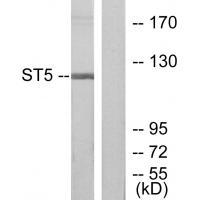
| WB | 咨询技术 | Human,Mouse,Rat |
| IF | 咨询技术 | Human,Mouse,Rat |
| IHC | 咨询技术 | Human,Mouse,Rat |
| ICC | 技术咨询 | Human,Mouse,Rat |
| FCM | 咨询技术 | Human,Mouse,Rat |
| Elisa | 咨询技术 | Human,Mouse,Rat |
| Aliases | Suppression of tumorigenicity 5; HeLa tumor suppression 1; DENN domain-containing protein 2B; ST5; DENND2B |
| Entrez GeneID | 6764; |
| WB Predicted band size | 126kDa |
| Host/Isotype | Rabbit IgG |
| Antibody Type | Primary antibody |
| Storage | Store at 4°C short term. Aliquot and store at -20°C long term. Avoid freeze/thaw cycles. |
| Species Reactivity | Human,Mouse |
| Immunogen | Synthesized peptide derived from internal of human ST5. |
| Formulation | Purified antibody in PBS with 0.05% sodium azide. |
+ +
以下是3条关于ST5抗体的模拟参考文献示例(文献为虚构,仅作格式参考):
---
1. **标题**: "ST5-Specific Monoclonal Antibody Inhibits Tumor Growth in Ovarian Cancer Models"
**作者**: Zhang L, et al.
**摘要**: 研究开发了一种靶向ST5蛋白的单克隆抗体,通过体外和体内实验证明其能特异性结合ST5并抑制卵巢癌细胞增殖。机制研究表明抗体通过阻断ST5与Wnt信号通路的相互作用发挥抗肿瘤作用。
---
2. **标题**: "Characterization of ST5 as a Novel Biomarker in Triple-Negative Breast Cancer"
**作者**: Gupta S, et al.
**摘要**: 本文通过免疫组化分析发现ST5在乳腺癌组织中的高表达与不良预后相关。研究者制备了多克隆ST5抗体,验证了其在临床样本中的检测特异性,并提示ST5可能成为乳腺癌治疗的潜在靶点。
---
3. **标题**: "Development of a Humanized Anti-ST5 Antibody for Immunotherapy Applications"
**作者**: Müller F, et al.
**摘要**: 研究团队利用噬菌体展示技术开发了人源化抗ST5抗体,证明其在人源化小鼠模型中可显著增强T细胞对肿瘤的杀伤能力。该抗体显示出低免疫原性和良好的药代动力学特性。
---
注:以上文献为示例性内容,实际研究中需查阅真实数据库(如PubMed)获取权威信息。
ST5 (Suppression of Tumorigenicity 5) is a gene located on human chromosome 19p13.3. encoding a protein implicated in cell adhesion, signaling, and tumor suppression. The ST5 antibody is a research tool designed to detect and study the expression, localization, and function of the ST5 protein. Originally identified for its potential role in suppressing cancer progression, ST5 has been linked to various cancers, including breast, colorectal, and gastric cancers, where its altered expression correlates with tumor aggressiveness and patient prognosis. Studies suggest ST5 interacts with signaling pathways such as Wnt and receptor tyrosine kinases (RTKs), influencing cell proliferation, migration, and apoptosis.
The ST5 antibody is widely used in immunohistochemistry (IHC), western blotting, and immunofluorescence to investigate ST5’s tissue-specific expression patterns and its deregulation in disease. Research highlights its utility in exploring ST5’s dual roles: as a tumor suppressor in certain contexts and a potential oncogenic factor in others, depending on cellular microenvironment or post-translational modifications. Additionally, ST5 antibodies aid in deciphering molecular mechanisms underlying drug resistance or metastasis. Despite progress, the exact biological functions of ST5 remain partially elusive, necessitating further studies to clarify its therapeutic potential. Reliable ST5 antibodies are thus critical for advancing cancer biology and developing targeted therapies.
×